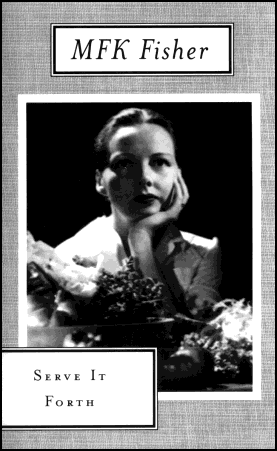Forth
Mary F. K. Fisher
(North Point Press)

There were vegetables boiled to a mush, Chef-Boy- For lunch, all we could expect was bologna and mayonnaise or ham on white. And, as Ms. Fisher says, "In the same way water or drippings may be designated as the basis of English cuisine," America's was "the flavor from innumerable tin cans."
- Snails, which are called escargots, should be caught in the morning. Take the young small snails, those that have black shells, from the vines or elder trees; then wash them in so much water that they throw up no more scum; then wash them once in salt and vinegar, and set them to stew in water. Then you must pick these snails out of the shell at the point of a needle or a pin; and then you must take off their tail, which is black, for that is their turd; and then wash them and put them to stew and boil them in water; and then take them out and put them in a dish to be eaten with bread. And also some say that they are better fried in oil and onion or some other liquid, after they have been cooked as above said; and they are eaten with spice and are for rich people.
The joy of cooking à la Fisher is the very rendering of her words --- words cooked in butter, garnished with parsley and chives and a bit of white wine. "Do you remember how Claudine used to crouch by the fire," she will write --- even though you and I don't know Claudine from Harvey Mudd --- "turning a hairpin just fast enough to keep the toasting nubbin of chocolate from dripping off?"
Or in mid-winter, eating a tangerine heated on the radiator, the maid in the background who "mutters of seduction and French bicyclists who ride more than wheels, tear delicately from the soft pile of sections every velvet string."
You know those white pulpy strings that hold tangerines into their skins? Tear them off. Be careful.
Her words are as magic as her taste in foods --- even to the point of describing the siege of Paris during the Franco-Prussian War, where they ate "scrambled rats and potted poodledog meat."
Her chapter on "Eating Alone" should assuage those of us who have often feared to be seen in a restaurant in such a solo act. She quotes Lucullus --- who told his majordomo: "It is precisely when I am alone," he said, "that you are required to pay special attention to the dinner."
At such times, you must remember, Lucullus dines with Lucullus.
I once wrote Fisher a fan-letter, extolling her way with words. She wrote me back, a letter typed not by some anonymous secretary but by the good lady herself, on an old Royal, no doubt, in which she spoke gently of the love for another person, intermixed --- love being what it is --- most wonderfully with the love for good food.